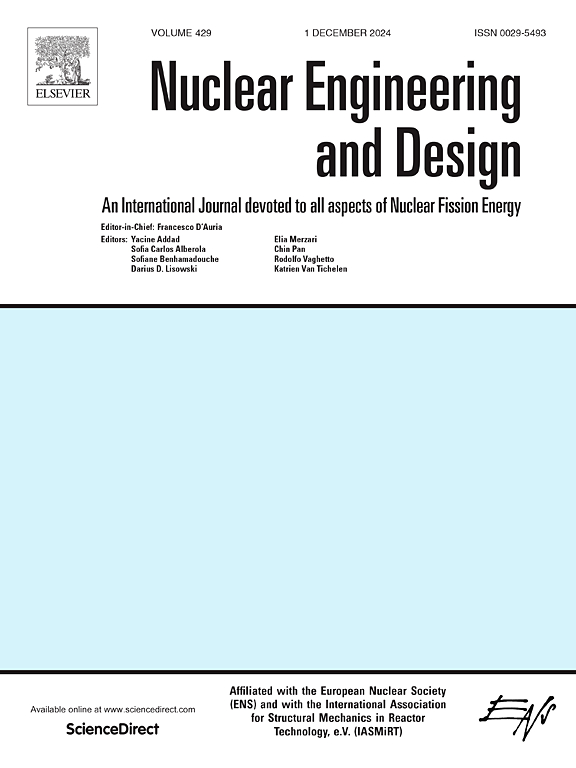Exploring the potential of artificial intelligence in nuclear waste management: Applications, challenges, and future directions
IF 1.9
3区 工程技术
Q1 NUCLEAR SCIENCE & TECHNOLOGY
引用次数: 0
Abstract
This study examines the increasing potential of artificial intelligence (AI) to transform nuclear waste management by enhancing procedures related to waste classification, treatment, storage, and disposal. The ability of AI to examine extensive datasets via machine learning and data analytics improves the accuracy and efficiency of trash classification. Additionally, AI-driven optimization methods enhance treatment procedures, reduce risks, and guarantee adherence to stringent regulatory standards, resulting in safer management of radioactive materials. These developments in AI enhance operational efficiency and refine decision-making frameworks, facilitating more accurate risk assessments. Integrating AI into nuclear waste management enables stakeholders to negotiate intricate regulatory frameworks more efficiently while minimizing environmental consequences and safeguarding public health.
This report identifies essential domains for forthcoming research and development in AI-augmented nuclear waste management. Essential directives encompass enhancing AI algorithms for real-time surveillance and predictive analytics, facilitating the early identification of possible problems, and enabling more proactive management. Moreover, developing technologies like robotic systems and autonomous platforms possess the capability to automate numerous waste management jobs, hence diminishing human risk exposure. The continuous developments illustrate AI’s revolutionary capacity to tackle critical issues in nuclear waste management, guaranteeing the safe, responsible, and sustainable management of radioactive materials for future generations.
探索人工智能在核废料管理中的潜力:应用、挑战和未来方向
本研究探讨了人工智能(AI)通过改进与废物分类、处理、储存和处置相关的程序,在改变核废物管理方面日益增长的潜力。人工智能能够通过机器学习和数据分析检查大量数据集,从而提高垃圾分类的准确性和效率。此外,人工智能驱动的优化方法还能改进处理程序、降低风险并确保遵守严格的监管标准,从而实现更安全的放射性材料管理。人工智能的这些发展提高了运营效率,完善了决策框架,促进了更准确的风险评估。将人工智能融入核废料管理,可使利益相关者更有效地协商错综复杂的监管框架,同时最大限度地减少环境后果,保障公众健康。本报告确定了人工智能增强型核废料管理领域即将开展的研究与开发的基本领域。基本方向包括增强用于实时监控和预测分析的人工智能算法,促进早期识别可能出现的问题,并实现更加积极主动的管理。此外,机器人系统和自主平台等开发中的技术有能力将大量废物管理工作自动化,从而降低人类面临的风险。这些不断发展的技术表明,人工智能在解决核废料管理的关键问题方面具有革命性的能力,可确保为子孙后代提供安全、负责和可持续的放射性材料管理。
本文章由计算机程序翻译,如有差异,请以英文原文为准。
求助全文
约1分钟内获得全文
求助全文
来源期刊

Nuclear Engineering and Design
工程技术-核科学技术
CiteScore
3.40
自引率
11.80%
发文量
377
审稿时长
5 months
期刊介绍:
Nuclear Engineering and Design covers the wide range of disciplines involved in the engineering, design, safety and construction of nuclear fission reactors. The Editors welcome papers both on applied and innovative aspects and developments in nuclear science and technology.
Fundamentals of Reactor Design include:
• Thermal-Hydraulics and Core Physics
• Safety Analysis, Risk Assessment (PSA)
• Structural and Mechanical Engineering
• Materials Science
• Fuel Behavior and Design
• Structural Plant Design
• Engineering of Reactor Components
• Experiments
Aspects beyond fundamentals of Reactor Design covered:
• Accident Mitigation Measures
• Reactor Control Systems
• Licensing Issues
• Safeguard Engineering
• Economy of Plants
• Reprocessing / Waste Disposal
• Applications of Nuclear Energy
• Maintenance
• Decommissioning
Papers on new reactor ideas and developments (Generation IV reactors) such as inherently safe modular HTRs, High Performance LWRs/HWRs and LMFBs/GFR will be considered; Actinide Burners, Accelerator Driven Systems, Energy Amplifiers and other special designs of power and research reactors and their applications are also encouraged.
 求助内容:
求助内容: 应助结果提醒方式:
应助结果提醒方式:


